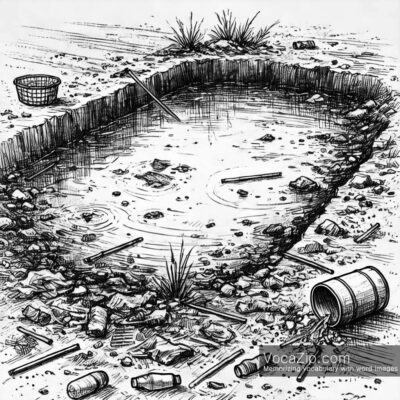stagnant meaning
stagnant :
Estancado, inactivo
Adjetivo
▪ The pond water is stagnant.
▪ El agua del estanque está estancada.
▪ The economy has been stagnant for years.
▪ La economía ha estado estancada durante años.
paraphrasing
▪ still – quieto
▪ inactive – inactivo
▪ motionless – inmóvil
▪ idle – inactivo

Pronunciation
stagnant [ˈstæɡ.nənt]
El adjetivo tiene el acento en la primera sílaba "stag", y se pronuncia como "stág-nənt".
Common phrases and grammar about stagnant
stagnant - Common meaningn
Adjetivo
Estancado, inactivo
Part of Speech Changes for stagnant
▪ stagnation (sustantivo) – estancamiento
▪ stagnate (verbo) – estancarse
▪ stagnantness (sustantivo) – estado de estancamiento
Common Expressions with stagnant
▪ stagnant water – agua estancada
▪ stagnant economy – economía estancada
▪ remain stagnant – permanecer estancado
▪ become stagnant – volverse estancado
Important examples of stagnant in TOEIC
Vocabulary examples from the TOEIC test
En las preguntas de vocabulario del TOEIC, "stagnant" se utiliza principalmente en contextos relacionados con la economía o el agua.
Ejemplo de palabra fácilmente confundible: stagnant (estático)
Grammar examples from the TOEIC test
"Stagnant" se usa principalmente como adjetivo para describir algo que no se mueve o no progresa.
stagnant
Idioms and fixed expressions in TOEIC
"stagnant water" significa "agua estancada" y se usa frecuentemente para describir cuerpos de agua sin movimiento.
"stagnant economy" se utiliza para describir una economía que no está creciendo ni mejorando.
Differences between similar words and stagnant
stagnant
,
still
differences
"Stagnant" se refiere a algo que no se mueve ni crece, mientras que "still" simplemente significa que algo está quieto o en reposo.
stagnant
,
inactive
differences
"Stagnant" implica una falta de movimiento o crecimiento, mientras que "inactive" significa no estar en uso o no estar activo.
Words with the same origin as stagnant
The origin of stagnant
La etimología de "stagnant" proviene del latín "stagnare", que significa "detenerse" o "permanecer inmóvil".
Word structure
Está compuesto por la raíz "stag" (detenerse) y el sufijo "nant" (adjetivo), por lo que "stagnant" tiene la estructura de palabra que significa "detenido".
Words with the same origin
La raíz de "stagnant" es "stag" (detenerse). Palabras con la misma raíz incluyen "stagnate" (estancarse) y "stagnation" (estancamiento).






